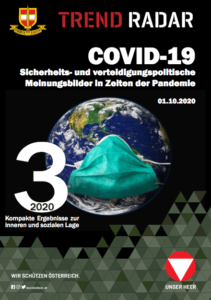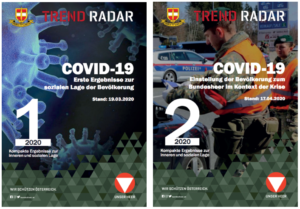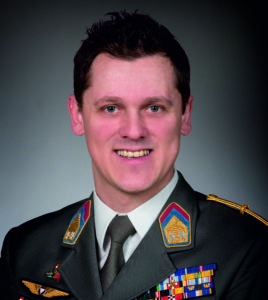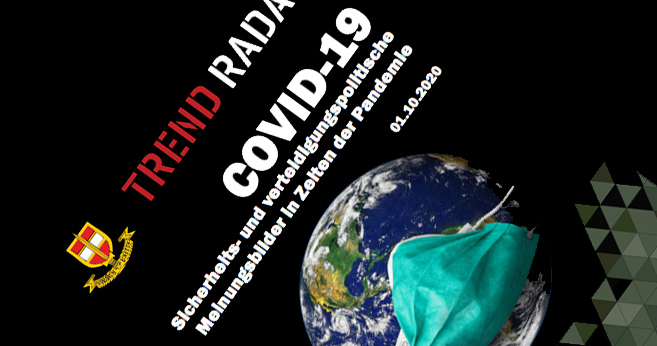The Center for People-Oriented Leadership and Defence Policy has been publishing some of its research findings in “Trend Radar” since last year. Starting this year, the publication series will appear four times a year.

Since 2016, the Center for People-Oriented Leadership and Defence Policy (ZMFW) at the National Defence Academy has been surveying the “internal and social situation” of the Armed Forces as part of employee surveys. In doing so, social science-based findings are obtained on the operational readiness of the armed forces in order to identify potential for improvement. In terms of content, it deals with topics such as job satisfaction and stress, the attractiveness of the armed forces as an employer and the compatibility of family, leisure and career. The reports on the social situation are produced annually and can be accessed at www.bundesheer.at under the heading “Scientific publications”. In addition to collecting this “internal view” of the armed forces, the ZMFW also has the task of obtaining information on the attitudes of the population and the development of values in civil society in the sense of an “external view”. To this end, the social researchers at the ZMFW conduct population surveys in cooperation with opinion research institutes. In particular, the threat perception, security policy attitudes and the image of the armed forces among Austrians are recorded. In order to increase the significance of the survey data, the ZMFW also cooperates with social scientists from the German and Swiss armed forces, who conduct similar surveys.

The results of this research, which also includes studies by civilian research institutions, offer a wide range of insights into the relationship between Austrians and the armed forces and defense policy issues. Since last year, these have been published in the publication series “Trend Radar – compact results on the domestic and social situation” by the National Defense Academy. “It is particularly important to keep our finger on the pulse of the times in the areas of public relations work, information officers, military policy and personnel recruitment,” says Wolfgang Prinz, one of the authors of the Trend Radar, and continues: “On the one hand, our results to date show the positive developments in recent decades. For example, the population’s trust in the armed forces has more than doubled since 1990.” Social support for the armed forces is therefore generally high. On the other hand, there is also a need for action: “In general, there is little awareness of international security policy issues among the Austrian population. As far as the Austrian Armed Forces are concerned, we also see that we are well behind the German Armed Forces in terms of attractiveness as an employer. This is due, for example, to the fact that young people have hardly any concrete ideas about the profession of soldier,” adds the social researcher. Findings such as these can be used, for example, to focus more on international events in military policy education or to make personnel recruitment measures more effective.

Gerd Hiess, head of the ZMFW, refers to other target groups: “As a commander, I always have to think about the civilian operational environment. The survey results published in Trend Radar can therefore provide essential support for commanders and managers in the armed forces. During the coronavirus crisis, for example, we analyzed the threat perception of the population in a timely manner and surveyed the acceptance of Covid assistance deployment. This provides the assistance forces with important information about how the population feels about them. On the one hand, this can be important for the motivation of the troops. On the other hand, such analyses show which population groups should be particularly targeted for sensitivity and confidence-building measures.” Hiess continues: “The appearance of the Trend Radar also has a lot to do with this target group. Managers have little time and are best placed to draw conclusions for their own area of responsibility. The Trend Radar is therefore emphatically compact, fact-oriented and largely avoids interpretations. The editions on the coronavirus crisis have also shown that our analyses are not only very popular with managers in the armed forces, but also in bodies such as state crisis and disaster management, as well as with local authorities and interested citizens.” Last but not least, the publication series is therefore also aimed at the interested public and research institutions. “We also want to make a contribution to the security policy discourse. Civilian research institutions usually only deal sporadically or with individual security policy topics. The continuity of our surveys enables us to highlight developments, establish correlations and analyze future trends – hence the title of the publication series,” explains Wolfgang Prinz.
Trend Radar has been published four times a year since this year and is available online at www.bundesheer.at under the heading “Scientific publications” section. The print editions can be obtained free of charge from the Center for People-Oriented Leadership and Defence Policy.










